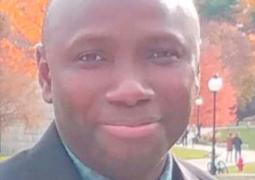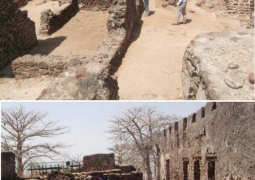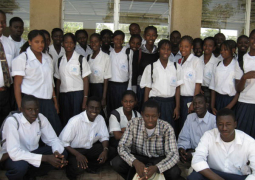The WHO Country Office last week donated an assortment of medical items and supplies worth about $66000 (sixty-six thousand United States Dollars) to the National Disaster Management Committee, at the Office of the Vice-President. The donated items included medicines, detergents and other medical supplies, and were part of WHO's contribution to the flash flood of September 2009, which affected some 14000 people.
Prior to this donation, the WHO had been working closely with the national health authorities and the United Nations family in addressing the health care and other needs within its mandate as the United Nations specialised agency for health.
Presenting the items to Vice-President, Isatou Njie-Saidy, the WHO Representative to The Gambia, Dr. Thomas Sukwa, said that the donation was a follow-up to the flash floods of 2009, which affected some parts of the African Region, including The Gambia.
As part of a consolidated UNCT response to support government efforts, an application to the Central Emergency Response Fund (CERF) was made to that effect including the health component.
The medicines and supplies that WHO presented were procured under the health component of the CERF grant.
As disasters, particularly floods often result in serious health consequences, Dr. Sukwa appealed to the national authorities to position the items at strategic places/health facilities accessible to the thousands of people affected or may be in need of these facilities. He said that the WHO was privileged to make the contribution not only by virtue of its mandate as coordinator of global health work, but as the most critical partner in supporting governments in times of disasters in managing the attendant health problems.
Receiving the items on behalf of the National Disaster Council, the Vice-President, Dr. Ajaratou Isatou Njie-Saidy, described the WHO as a 'real and genuine partner,' whose contributions to the overall national development agenda, as manifested by today's donation, go beyond 'mainstream health,' addressing other critical issues with far -reaching health implications, such as disasters.
According to her, the government of The Gambia is very appreciative and indeed fully cognizant of the support the WHO renders to the health sector in general. She appealed to the United Nations family, including WHO to lend more support to the implementation of the national disaster policy and strategic plan developed recently with the active participation of the United Nations system and other partners.
She said the policy and the plans were developed within the context of climate change, whose implementation therefore requires active collaboration with and support of a critical partner like WHO, and indeed the entire United Nations family.
In conclusion, she promised that the donated items would be put to good use, and that the health authorities would ensure their accessibility to the victims and those in need of them.
Speaking earlier, the Honourable Ministers of Health and Social Welfare, Dr. Abubacarr Gaye and Forestry and Environment, Jatto Sillah, both expressed similar sentiments and thanked WHO for its invaluable support to the health sector.
The presentation ceremony, chaired by the Honorable Minister for Local Governments and Lands, Ismaila Sambou, was attended by some senior staff of the WHO Country Office and the Ministry of Health, as well as members of the National Disaster Management Committee.
Read Other Articles In Article (Archive)

OPINION: WHAT FACTORS CONTRIBUTE TO A NATION’S GLOBAL STANDING?
Feb 27, 2017, 11:01 AM



